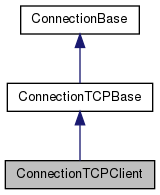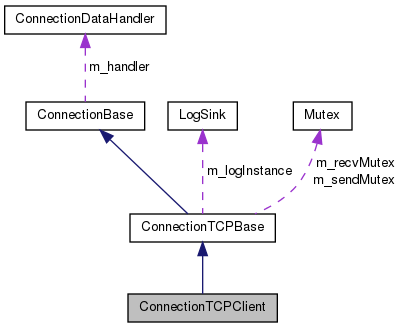#include <connectiontcpclient.h>


Public Member Functions | |
| ConnectionTCPClient (const LogSink &logInstance, const std::string &server, int port=-1) | |
| ConnectionTCPClient (ConnectionDataHandler *cdh, const LogSink &logInstance, const std::string &server, int port=-1) | |
| virtual | ~ConnectionTCPClient () |
| virtual ConnectionError | recv (int timeout=-1) |
| virtual ConnectionError | connect () |
| virtual ConnectionBase * | newInstance () const |
 Public Member Functions inherited from ConnectionTCPBase Public Member Functions inherited from ConnectionTCPBase | |
| ConnectionTCPBase (const LogSink &logInstance, const std::string &server, int port=-1) | |
| ConnectionTCPBase (ConnectionDataHandler *cdh, const LogSink &logInstance, const std::string &server, int port=-1) | |
| virtual | ~ConnectionTCPBase () |
| virtual bool | send (const std::string &data) |
| virtual ConnectionError | receive () |
| virtual void | disconnect () |
| virtual void | cleanup () |
| virtual void | getStatistics (int &totalIn, int &totalOut) |
| int | socket () const |
| void | setSocket (int socket) |
 Public Member Functions inherited from ConnectionBase Public Member Functions inherited from ConnectionBase | |
| ConnectionBase (ConnectionDataHandler *cdh) | |
| virtual | ~ConnectionBase () |
| ConnectionState | state () const |
| void | registerConnectionDataHandler (ConnectionDataHandler *cdh) |
| void | setServer (const std::string &server, int port=-1) |
| const std::string & | server () const |
Detailed Description
This is an implementation of a simple TCP connection.
You should only need to use this class directly if you need access to some special feature, like the raw socket(), or if you need HTTP proxy support (see gloox::ConnectionHTTPProxy for more information).
- Since
- 0.9
Definition at line 36 of file connectiontcpclient.h.
Constructor & Destructor Documentation
| ConnectionTCPClient | ( | const LogSink & | logInstance, |
| const std::string & | server, | ||
| int | port = -1 |
||
| ) |
Constructs a new ConnectionTCPClient object.
- Parameters
-
logInstance The log target. Obtain it from ClientBase::logInstance(). server A server to connect to. port The port to connect to. The default of -1 means that XMPP SRV records will be used to find out about the actual host:port.
- Note
- To properly use this object, you have to set a ConnectionDataHandler using registerConnectionDataHandler(). This is not necessary if this object is part of a 'connection chain', e.g. with ConnectionHTTPProxy.
Definition at line 45 of file connectiontcpclient.cpp.
| ConnectionTCPClient | ( | ConnectionDataHandler * | cdh, |
| const LogSink & | logInstance, | ||
| const std::string & | server, | ||
| int | port = -1 |
||
| ) |
Constructs a new ConnectionTCPClient object.
- Parameters
-
cdh An ConnectionDataHandler-derived object that will handle incoming data. logInstance The log target. Obtain it from ClientBase::logInstance(). server A server to connect to. port The port to connect to. The default of -1 means that SRV records will be used to find out about the actual host:port.
Definition at line 51 of file connectiontcpclient.cpp.
|
virtual |
Virtual destructor
Definition at line 58 of file connectiontcpclient.cpp.
Member Function Documentation
|
virtual |
Used to initiate the connection.
- Returns
- Returns the connection state.
Implements ConnectionBase.
Definition at line 67 of file connectiontcpclient.cpp.
|
virtual |
This function returns a new instance of the current ConnectionBase-derived object. The idea is to be able to 'clone' ConnectionBase-derived objects without knowing of what type they are exactly.
- Returns
- A new Connection* instance.
Implements ConnectionBase.
Definition at line 62 of file connectiontcpclient.cpp.
|
virtual |
Use this periodically to receive data from the socket and to feed the parser.
- Parameters
-
timeout The timeout to use for select in microseconds. Default of -1 means blocking.
- Returns
- The state of the connection.
Implements ConnectionBase.
Definition at line 125 of file connectiontcpclient.cpp.
The documentation for this class was generated from the following files:
 1.8.1.2
1.8.1.2